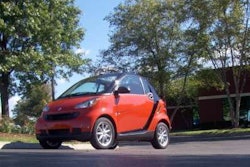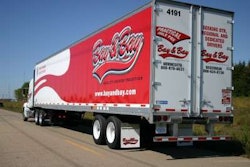Wal-Mart Stores Inc. announced Monday, Feb. 2, that it will test two new types of heavy-duty commercial hybrid trucks and two different alternatively fueled heavy-duty trucks as a part of the company’s efforts to build on its progress in developing a more sustainable trucking fleet.
Wal-Mart says the new trucks include:
“In order to meet our goal of doubling our fleet efficiency, we are taking an active role in the development of these technologies,” says Chris Sultemeier, senior vice president of transportation for Bentonville, Ark.-based Wal-Mart Stores Inc. “We look forward to determining if these technologies will help reduce our environmental footprint, are viable for our business and provide a return on investment.”
Wal-Mart says it achieved more than a 25 percent increase in efficiency within its private fleet between 2005 and 2008, surpassing one of the company’s stated sustainability goals. By reaching this goal, Wal-Mart says it has been able to reduce its carbon dioxide emissions and its fuel use; this goal was reached by using a combination of new, innovative technologies, better delivery routes and by loading its trailers more efficiently. Now, the company says it is working toward its goal of doubling its fleet efficiency by 2015, from its 2005 baseline; part of this pilot program is to determine if alternatively fueled trucks can help move Wal-Mart toward that goal, in addition to reducing environmental impacts.
Wal-Mart has actively engaged several suppliers to develop and test these new technologies, including Arvin Meritor, Eaton, Peterbilt and International, as well as smaller companies. Wal-Mart says it will test these new technologies throughout 2009.
Meritor says its prototype heavy-duty truck is equipped with the first Meritor diesel-electric drivetrain. “While most hybrid systems today are best suited for start-stop applications, our hybrid drivetrain is specifically designed for linehaul over-the-road trucks, the largest segment of the commercial vehicle population,” says Carsten J. Reinhardt, president of Commercial Vehicle Systems business for the Troy, Mich.-based company.
Meritor says its dual-mode hybrid drivetrain combines both mechanical and electrical propulsion systems. Under 48 mph, vehicle propulsion is delivered entirely through an electric motor with power from lithium ion batteries; these batteries are recharged through regenerative braking and/or an engine-driven generator. As the vehicle approaches highway speed, the drivetrain phases to a diesel-powered system with the electric motor providing power, only as required, allowing for total system optimization.
Meritor says the key differentiation of this system is its ability for zero-emissions mode over a wide range of vehicle driving conditions; this allows the truck to operate in places where emissions are restricted, like a port or urban area. Additionally, the batteries provide continuous power for hotel loads during an overnight rest period, eliminating the need for engine idling or other redundant anti-idling systems, according to the company; electrification of accessories such as the air or AC compressors provides further efficiency benefits.
The Meritor hybrid drivetrain was developed in collaboration with Navistar and Cummins and is comprised of a proprietary motor/generator unit and high-capacity lithium ion batteries, as well as the overall power-management system. Also outfitted on the Wal-Mart tractor are a Meritor tandem drive axle and an advanced MeritorWABCO anti-lock braking system with integrated stability control and driver assistance systems.











